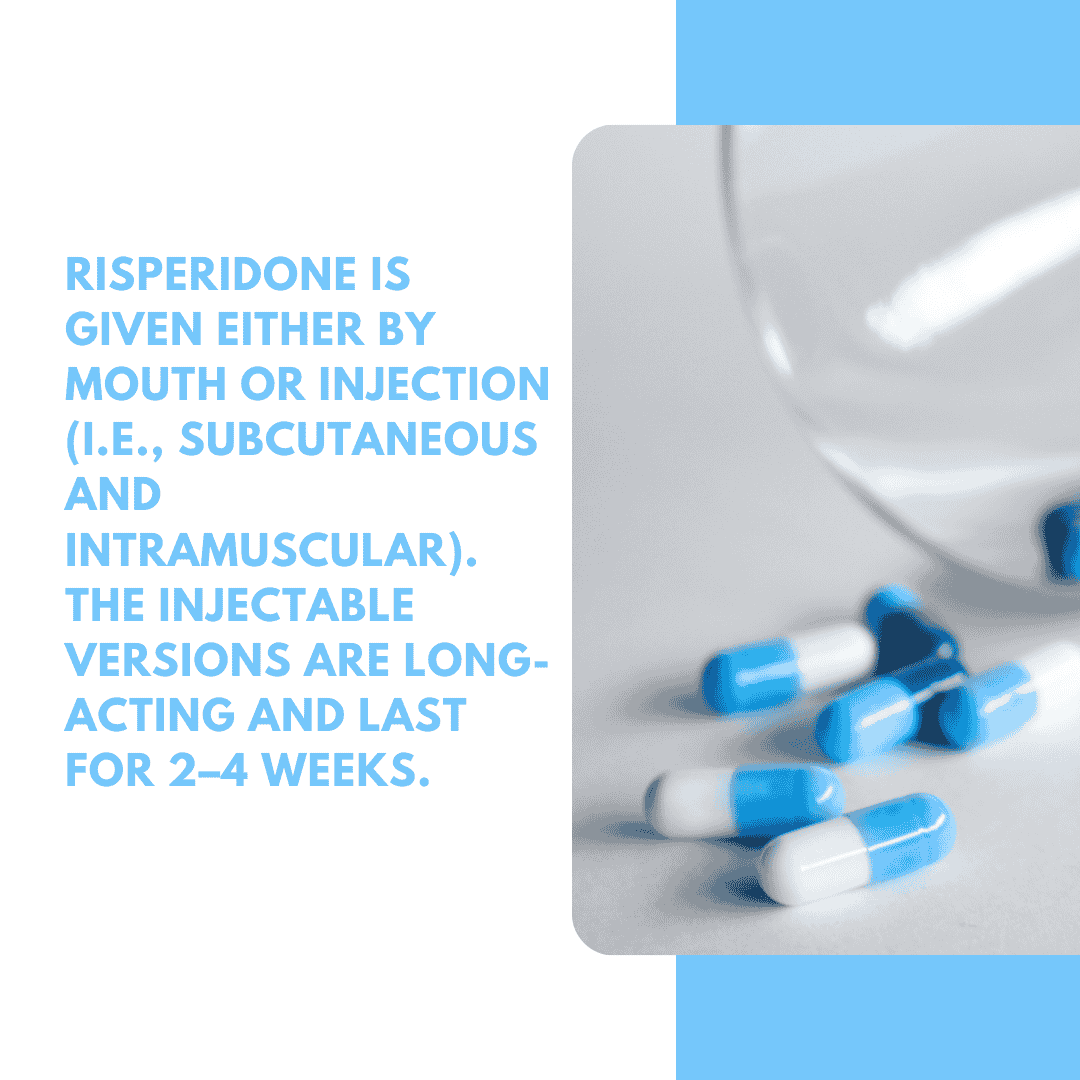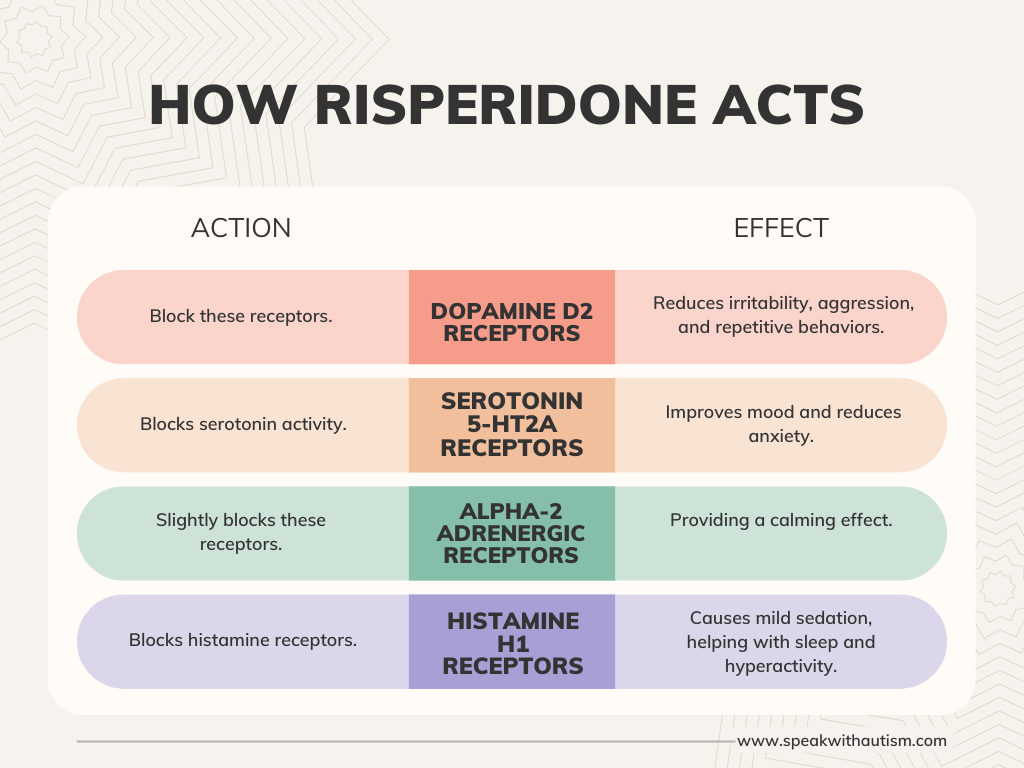Risperidone is an atypical antipsychotic medication used to treat various mental health conditions, including autism spectrum disorder, ADHD (attention deficit hyperactivity disorder), Dementia, Schizophrenia, and Bipolar disorder. It is important to seek expert medical advice before using risperidone. This medication is often prescribed to manage repetitive behaviors, irritability, aggression, and self-harming behaviors in children with autism spectrum disorder. Risperidone for Autism is typically recommended by doctors for cases of severe behavioral symptoms associated with autism.
Table of Contents
Risperidone in List of Essential list of Medicine
Risperidone is included in the World Health Organization’s list of essential medicines and is available in generic form. In 2024, it was the 183rd most commonly prescribed medication in the United States, with 2,609,294 prescriptions written for a total of 536,202 patients.

Benefits of Risperidone
- The primary benefit of risperidone is that it helps manage sensory issues in children with autism.
- Studies indicate that children who are given risperidone show reduced aggression, fewer tantrums, less self-injurious behavior, and improved performance in daily activities.
- Over time, they also tend to become more focused.
Name of Risperidone in the Market
Risperidone is available in the market under different brand names. Some of its brand names are as follows:
Risperdal
Risnia
Risdone
Sizodon
Ridal
These brand names are marketed by different pharmaceutical companies but the active ingredient in all of them is Risperidone.
Side effects of Risperidone
Like every medicine, there are some side effects of Risperidone. some of risperidone side effects are as follows:
- Drowsiness
- Dizziness
- Constipation
- Elevated prolactin levels
- Sedation
- Restlessness
- Nausea
- Vomiting
- Weight gain
- Anxiety
- Difficulty urinating
- Stomach pain
- Blurred vision
some of serious side effects are:
- Neuroleptic malignant syndrome
- High blood sugar levels
- Tardive Dyskinesia
- Seizures
- Sweating
- Confusion
Dosage of Risperidone
The dosage of risperidone depends on the child’s age, behavior, and individual needs. It should never be altered without a doctor’s guidance. For children with autism, treatment usually begins with a low dose, such as 0.25 mg or 0.5 mg, and is gradually increased based on the child’s response. If the child experiences side effects that worsen behavior, parents should promptly discuss this with the doctor. The doctor who will adjusts the dosage accordingly. The final dose is carefully determined based on the child’s weight, age, and the severity of autism symptoms.
How Risperidone Acts
By acting on these receptors, risperidone helps improve symptoms of autism in children and gradually plays an important role in enhancing their life skills. Risperidone acts on the following receptors:

Dopamine D2 Receptors
- Action: block these receptors.
- Effect: reduces irritability, aggression, and repetitive behaviors.
Serotonin 5-HT2A Receptors
- Action: blocks serotonin activity.
- Effects: improves mood and reduces anxiety.
Alpha-2 Adrenergic Receptors
- Action: slightly blocks these receptors.
- Effects: providing a calming effect.
Histamine H1 Receptors
- Action: blocks histamine receptors.
- Effects: causes mild sedation, helping with sleep and hyperactivity.
Success Stories
An 8-year-old boy has now become completely self-independent thanks to risperidone. His mother shared that he was diagnosed with severe autism at the age of 2 years and 5 months. After nearly 5 years of using risperidone, her son has successfully developed self-independence skills.
My Experience with Risperidone
My son is 5 years old and was diagnosed with moderate autism in 2021. He had several behavioral challenges initially, including sleep issues where he slept very little and often stayed up all night, laughed and cried a lot for no reason, could not make eye contact, did not respond to his name, so many sensory difficulties, could not speak and had severe gastric issues like diarrhea and stomach pain. He also displayed repetitive behavior, crowd aversion, no social interactions, aggression, self-harm, stereotypical behavior, and biting others, among several other problems.
Due to his behaviour, the doctor prescribed Risperidone for my son. I have been giving him Risperidone orally for the past three years, and almost all of these behaviours have gradually improved. Although he has not fully recovered, the improvement has been significant. Based on my experience, risperidone has been the best option for my son.
Conclusion
Before using risperidone for your child, it is essential to seek expert advice. Risperidone is a medication that should only be administered to autistic children under a doctor’s supervision. The doctor monitors the child’s behavior and adjusts the dosage as needed. While many families have experienced success with risperidone, some parents have also reported side effects. Therefore, proper dose adjustment is crucial to managing the child’s behavior effectively and minimizing potential side effects.
You can also read this blog in Hindi Risperidone in Autism: दुष्प्रभाव, फ़ायदे, और Success Stories.
Frequently Asked Questions (FAQs)
What is Risperidone used for?
Risperidone is an atypical antipsychotic medication used to treat various mental health conditions, including autism spectrum disorder, Dementia, Schizophrenia, and Bipolar disorder.
What is Risperdal?
Risperdal is a brand name for risperidone, an atypical antipsychotic medication used to treat mental conditions such as schizophrenia, bipolar disorder, autism, and other psychiatric disorders. Risperidone works by stabilizing mood and behavior through its effect on neurotransmitters like dopamine and serotonin. However, it can have side effects such as weight gain, drowsiness, dizziness, sedation, etc.
What is the lowest dose of risperidone?
For children with autism, treatment usually begins with a low dose, such as 0.25 mg or 0.5 mg, and is gradually increased based on the child’s response. The final dose is carefully determined based on the child’s weight, age, and the severity of autism symptoms.
What does risperidone do?
Risperidone is used to manage various psychiatric disorders. It acts on dopamine, Serotonin 5-HT2A, histamine (H1), and alpha-2 adrenergic receptors, helping to treat irritability, repetitive behaviors, aggression, and mood instability.
Does risperidone cause weight gain?
Yes, Risperidone causes weight gain, which is a common side effect. This Weight gain can occur due to increased appetite, metabolic changes, and sedation.
